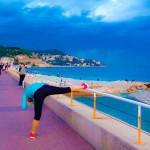Living with lupus
Although there is no cure for lupus, there are several measures that patients can take to cope with the disease.
Sun care – use sunscreen with an SPF of at least 15 that can block both UVA and UVB rays
Diet – eat a nutritious and well-balanced diet with limited sugar and salt intake if on corticosteroids. There is some evidence that fish has anti-inflammatory properties, but alfalfa sprouts may increase inflammation
Pain management – apply moist heat to painful joints or soak in a hot tub or Jacuzzi
Exercise – low-impact walking, swimming, aerobics and cycling may help prevent muscle atrophy and lower the risk of osteoporosis
Rehabilitation – physical, occupational and vocational therapists can help you to strengthen muscles, exercise, lower stress, recommend assistive devices and train for a job that does not exacerbate symptoms
Do not smoke
Fatigue – control fatigue by remaining active and resting for an appropriate amount of time
Relationships – maintain good relationships with the physicians that are helping you to manage lupus. Keep appointments, be honest and take medicines
Pregnancy – remain aware and consult with a doctor about risks associated with pregnancy for you and your child
Cognitive function – a psychologist or cognitive therapist may be helpful if lupus leads to cognitive dysfunction or memory loss.
Most people with lupus can continue their usual daily activities. They may find that they need to cut back on their activity levels, get help with childcare or change the way they work because of fatigue, joint pain or other symptoms. They may also find that they have to take time off from daily activities entirely.21
Most people with lupus can expect to live a normal or near-normal lifespan. This depends on how severe the disease is, whether it affects vital organs (such as the kidneys) and how severely these organs are affected.
Lupus usually does not cause joint damage or deformity which may happen in people who have rheumatoid arthritis, another autoimmune disease.
No research to date has shown that alternative and complementary therapies such as special diets, fish oils, ointments and creams, chiropractic treatment and homeopathy affect the disease process or prevent organ damage.
However, some patients say complimentary herbal preparations help with their symptoms in addition to holistic approaches, which may help the patient cope or reduce some of the stress associated with living with a chronic illness.
One of the primary goals of wellness for people with lupus is coping with the stress of having a chronic disorder. Effective stress management varies from person to person. Some approaches that may help include exercise, relaxation techniques such as meditation and setting priorities for spending time and energy.
With thanks to medicalnewstoday.com


